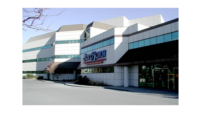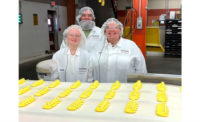Just Born Quality Confections reports its August 2020 donation of $100,000 to local organizations offering COVID-19 relief has provided more than one million meals to nearly 16,000 families throughout the Lehigh Valley.
“As a family-owned company that has been part of the Lehigh Valley for decades, Just Born knows it can only thrive if our community thrives as well,” says Meg Dowd, corporate affairs manager at Just Born Quality Confections. “It’s important for us to shine a light on the work done by local non-profits during this time. By sharing their efforts, we amplify their missions as well as the voices of those they serve.”
Just Born’s donation was divided between various organizations within the community and focused on those that provided access to food, shelter and education. Of the $100,000, the company invested $50,000 into the United Way of the Greater Lehigh Valley’s COVID-19 Community Response Fund, which aimed to strengthen safety-net services for those impacted by COVID-19. This fund, supported by 22 other funding partners and many individual donors, focused on strengthening food access, housing, income support and mental health services. The collaborative fund provided 65 nonprofits much-needed funding in the earliest days of the pandemic.
The remaining $50,000 was donated to additional non-profit organizations who provided food, housing and education access through a special grant process.
Food access funding recipients
Northeast Community Center, a social service agency focused on providing programs and services to the Marvine-Pembroke community, purchased an industrial freezer and refrigerator with their funds. With this new equipment, they were able to increase the amount of frozen food distributed by 191 percent. Now they can also easily distribute refrigerated products like milk, cheese and fresh produce.
Aspire to Autonomy, whose mission is to eliminate human trafficking, used the funding to provide 300 families with boxes of food and PPE supplies in Southside Bethlehem and Easton. Each box fed a family of four and included safety kits with hand sanitizer and masks.
New Bethany Ministries, which provides comprehensive programming to help individuals and families achieve self-sufficiency, created a Remote Access Choice Pantry. By implementing remote orders for their food pantry, they limited person-to-person contact, reduced lines, and ensured safety of their clients, all while continuing to address food insecurity.
The Boys & Girls Club of Easton, which provides affordable programming that enables young people most in need to reach their full potential, served an additional 560 meals to its members over a nine-week period.
The Family Emergency Meal Program, offered by the Bethlehem Branch of the Greater Valley YMCA, ensured barriers were removed for families to receive year-round access to free healthy meals. They served more than 50,000 free meals to children, families and seniors at multiple locations throughout 2020.
Second Harvest Food Bank serves a six-county area comprised of Lehigh, Northampton, Carbon, Monroe, Pike, and Wayne counties. They strive to provide food insecure individuals, including veterans, senior citizens, and children through programs that provide fresh foods, and necessary nutrients.
Ortiz Ark Foundation, dedicated to improving the lives of those in the Allentown community, provided meals, toiletries, and groceries to more than 250 families a week at various pop-up locations throughout Lehigh and Northampton County.
Hispanic Center of the Lehigh Valley, whose mission is to improve the quality of lives of families by empowering them to become more self-sufficient while promoting intercultural understanding, provided food access to more than 2,300 individuals who utilized their food pantry. They also ensured their seniors had culturally appropriate groceries and food delivered to their home two times a month.
Shelter access funding recipients
Valley Youth House, who helps young people build foundations for future growth and independence, used the funds to help provide a home for vulnerable, abused and homeless youth. Due to the pandemic, many of their youth required longer stays in their residential programs to prevent a return to homelessness.
Allentown Rescue Mission continued to provide emergency shelter, traditional housing, medical assessments, and job training programs to address many of the root causes of poverty and provide a path out of homelessness.
Bethlehem Emergency Shelter provided emergency shelter services to 70 adult men and women each night during the pandemic. They actively worked to connect their guests with support services and were diligent about preventing the spread of COVID-19 at the shelter.
Third Street Alliance assisted homeless and at-risk families by arranging hotels for COVID-positive and unsheltered individuals. They collaboratively worked to find solutions for those economically impacted by COVID-19 by launching a valley-wide Eviction Conciliation Program, providing continuous shelter to their homeless families.
Sixth Street Shelter offers sheltering and supportive services to help prepare families for the challenges of a difficult job and rental market that too often result in homelessness. It is the only family shelter in the region that admits families with at least one child under age 18 (including those with fathers and teenage boys, multi-generational families, and those from the LGBTQ+ community) and houses them in their own private apartments.
Education access funding recipients
The Foundation for Bethlehem Schools’ Technology Initiative helped ensure academic success as the district shifted to virtual learning platforms. By providing students with digital tools, the foundation, the school district and supporters of the fund actively worked to prevent learning gaps while allowing students to progress as the curriculum intended.
The Boys and Girls Club of Bethlehem provided a Community Classroom to ensure youth in the Marvine Pembroke community had a safe space to complete their online assignments, participate in virtual class settings, receive individualized help and eat a hot meal.
The Foundation for Easton Schools ensured every student in grades K-2 had an iPad in order to participate in remote learning. By investing in iPads, the Easton Area School District helped to ensure all students had equitable opportunity to access their education.




